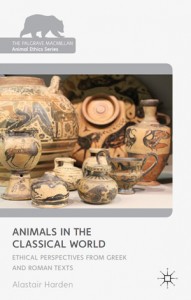Latest news
New Work on Animals in Classical Culture
11th November 2013
 Centre Associate Fellow Alastair Harden has published a pioneering work on animals and classics, titled Animals in the Classical World: Ethical Perspectives from Greek and Roman Texts.
Centre Associate Fellow Alastair Harden has published a pioneering work on animals and classics, titled Animals in the Classical World: Ethical Perspectives from Greek and Roman Texts.
The civilisations of Greece and Rome left detailed records of their experience and opinions of animals: in these societies, which practised mass sacrifice and large-scale public animal hunts, as well as being economically reliant on animal power and products, how were animals actually treated and how was it acceptable to treat them?
This sourcebook presents specially-prepared translations from Greek and Latin texts across several genres which give a wide-reaching sense of the place of the non-human animal in the moral register of Classical Greece and Rome. From theories of the origins of animal life and vegetarianism, literary uses of animal imagery and its role in formulating cultural identity, to vivid descriptions of vivisection, force-feeding, intensive farming, agricultural and military exploitation, and detailed accounts of animal-hunting and the trade in exotic animal products: the battleground of the modern animal rights debate is here given its historical foundation in a selection of nearly 200 passages of Classical authors from Homer to Porphyry.
The book is the latest in the Palgrave Macmillan book series on animal ethics produced by the Centre in partnership with Palgrave Macmillan.
Alastair Harden works at the Beazley Archive, Oxford University, and teaches at the Universities of Oxford and Reading, UK. He attended Belfast Royal Academy and studied Classical Archaeology and Ancient History at Oxford University, and Classics at the University of Reading. He is an Associate Fellow of the Oxford Centre for Animal Ethics and has written on animals in Classical Art. Alastair was also President of the Oxford University Animal Ethics Society.
For more information, see here.